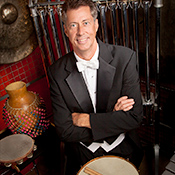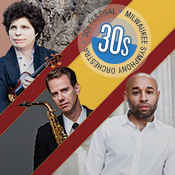
Water Festival Celebrates Community Partnership
David Lewellen
PUBLISHED
Tagged Under: 2022.23 Season, Partners
Aside from performing music related to water, the Milwaukee Symphony’s upcoming festival also seeks to relate water to the community.
Milwaukee’s place at the edge of the largest freshwater system in the world means that “in many ways, Milwaukeeans already celebrate water,” said Music Director Ken-David Masur. And because there are already organizations in town that explore that relationship, we could highlight that in dialogue with the music.”
Ideally, an orchestra festival goes beyond just what is heard in the concert hall. To connect audiences with current water projects in our community, the symphony is partnering with the UW-Milwaukee School of Freshwater Sciences and with WaterMarks, a Milwaukee initiative that links water use with the community and the arts. At many of the concerts over the three-week span, the two organizations will have tables and exhibits in the lobby space to show their water-related work to concertgoers.
“We wanted to lift up organizations in the community that are doing excellent work in the water industry,” said Maggie Seer, the MSO’s manager of institutional giving. “Hopefully, that will give them access to new audiences and connect with our patrons.”
The festival is part of the symphony’s broader goal to use its space fully, Seer said. Part of her job is developing corporate connections in the Milwaukee community that will get more of those employees into the hall, as well as more donations for the orchestra.
“It’s a rewarding experience to deep dive into our water resources,” Seer said. “It did require a lot of thought, given that water is such a vast topic, and we chose to use the conservation and education lens.”
“Milwaukee has made an investment in its identity as a water city,” said Aaron Asis, project director with WaterMarks. The citywide initiative offers walking tours around Milwaukee neighborhoods and is working to install 25-foot-tall poles around the city that will light up if the sewer system overflows. The festival at the Bradley Symphony Center is “a new path to communicate with people,” he said.
It’s a similar opportunity for the School of Freshwater Sciences. UWM has had research and courses in the field since the 1960s, but Liz Sutton, manager of outreach programs, said that the standalone school was not established until 2009, and its showcase building in the Harbor District opened in 2014. “We always want to connect to the community,” she said. “We show that water is not just what comes out of the tap, but part of our culture. It’s not just what’s in the lab or in Lake Michigan. Water is the key to our health, our wealth, and our way of life.”
“There’s a big range of how composers captured what water means to them,” Masur said, as both the source of life and a powerful destructive element. And chronologically, from Handel to living composers, the festival spans about 300 years. “Every composer has been fascinated by this topic and wanted to capture it somehow for posterity.”
Last year, to mark the symphony’s first full season in the renovated Warner movie palace, the MSO did a three-week festival of music from the 1930s, in honor of the decade when the building opened. And going forward, Masur thinks that festivals built around some theme will be an almost annual event. “It’s a wonderful way to bring attention to some special things,” he said, “and we can welcome different types of audiences that might not normally come to concerts.”


